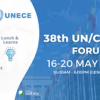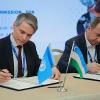News
Displaying Results 51 - 75 of 122
The transition from linear to circular economies requires fundamental rethinking of trade policies and regulations. “Harmonized System” codes (HS codes) are a key pillar of the tariff infrastructure for international trade. These HS codes were designed at a time when circular economy considerations…
The tenth meeting of the Task Force on Public Participation in Decision-making under the Aarhus Convention (Geneva (hybrid), 10–11 October 2022) focused on effective public participation in decision-making in the context of the coronavirus disease (COVID-19) pandemic and on health-related issues…
The global economy must be urgently steered away from unsustainable production and consumption patterns, which fuel the climate crisis, deplete natural resources and negatively impact both people and the environment. Global value chains are predominantly linear in nature, and the lack of…
Premature mortality attributable to poor air quality results in high costs. For example, a study by WHO and OECD estimates that in 2010 costs of air pollution related premature deaths in Georgia were at about 9 billion USD. The main sources of air pollution are the transport and agricultural…
The importance of clean air for the quality of our lives has recently been recognised by the United Nations General Assembly. What is more is that in the General Assembly session at the end of July, Member States overwhelmingly adopted a resolution recognising that a clean, healthy and sustainable…
As Ministers from across the UNECE region gather in the Cypriot capital of Nicosia to outline new initiatives to work towards a sustainable and ecological future at the 9th Environment for Europe Conference (5-7 October), the final report on the Batumi Action for Cleaner Air (BACA), adopted 6 years…
The extreme heat and drought that the region experienced this summer is a bleak reminder that current commitments under the Paris Agreement and those made last year at COP26 are nowhere near what is needed to limit global warming to below 1.5°C. Inaction is a policy choice that will lead to greater…
With the review of the amended Protocol to Abate Acidification, Eutrophication and Ground-Level Ozone (Gothenburg Protocol) about to enter its final round, expert groups under the UNECE Air Convention are now discussing latest findings to assess the effectiveness of measures.
The amended Protocol…
SPECA countries are facing unique challenges, stemming from at least three crises: the need to deal with the regional and global repercussions of the COVID-19 pandemic, the political upheaval in Afghanistan, and the conflict in Ukraine. With the correct policies and mechanisms for subregional…
Circular economy transformation is a new area of cooperation between the United Nations Economic Commission for Europe (UNECE) and the Government of Tajikistan. Under the overarching leadership of the Ministry of Economic Development and Trade, UNECE together with the UN Tajikistan, and in…
All too often we take the air we breathe and share for granted. Only when we breathe very polluted air, when we can smell and see the pollution, do we realize that the air around us is a precious good that needs to be protected, much like the water we drink. On the International Day of Clean Air…
World trade continues to be severely affected by global supply chain disruptions, exacerbated by shocks including the ongoing Covid-19 pandemic and the war in Ukraine. These challenges attest to the value of supporting and reinforcing trade facilitation measures to enhance resilience in all regions…
In the past few years, multiple shocks ranging from pandemics to conflicts have restricted the movement of goods and services, resulting in the number of countries facing significant disruptions in supply chains is increasing every year, affecting timely delivery of essential goods, such as food…
In June 2022, the World Trade Organization (WTO) Members agreed on the Ministerial Outcome Document, which marked for the first time the recognition of the importance of the multilateral trading system in addressing the triple global environmental crises of climate change and related natural…
With blockchain opening up many avenues in international trade – from facilitating financing and customs procedures to tracking due diligence and sustainability compliance – countries and companies are looking for successful practices to scale up their efforts to maximize the potential of this new…
July is a month to start enjoying the harvest of fruits and vegetables for many in Europe and the topic of reducing food loss and waste becomes very urgent. In Serbia, agriculture is an important sector of the economy, contributing around 6% of GDP. In March 2022 food production accounted for 10.4…
Last week, Parties to the UNECE Convention on Access to Information, Public Participation in Decision-Making and Access to Justice in Environmental Matters (Aarhus Convention) gathered alongside representatives of civil society, international organizations, academia, private organizations and other…
In view of the upcoming COP 27 of the UNFCCC, taking place in Egypt later this year, the growing threats on climate created by the textile and leather sectors call for our urgent action. If we continue down this path, we will fail by 50% to meet our 2030 emissions reduction targets, resulting in…
UNECE is supporting the Government of Moldova in its efforts to enhance its national innovation system to accelerate progress towards Sustainable Development. During the online meeting on 16 June, the two sides agreed to develop a Roadmap for Innovation and Technology Transfer, which will feed into…
Transport continues to be a significant source of air pollution, especially in cities in the UNECE region. Air pollutants, such as particulate matter (PM) and nitrogen dioxide (NO2), harm human health and the environment. Although air pollution from transport has decreased in the last decade…
Have you ever wondered what causes air pollution? Are you interested in learning about the effects of air pollution on your health and the environment? Do you want to learn how we can jointly work on cleaner air? If you replied yes to any of these questions, then you are encouraged to take the e-…
UNECE was engaged at the main global forum to assess and discuss progress in implementing the Sendai Framework for Disaster Risk Reduction (DRR) – the seventh session of the Global Platform for Disaster Risk Reduction (GP2022) held in Bali and online, 25-27 May 2022, fully embracing its theme: “…
Recent disruptions of supply chains have exposed fragilities in the current trading system and brought to light the importance of resilience and transparency in global trade.
UNECE and other international organizations play a crucial role in supporting countries (including both the public and…
The textile industry is a key driver of Uzbekistan’s economy, reflected in the country’s rank as sixth largest cotton producer in the world. In 2021, the country accelerated the battle against its child and forced labor violations in cotton harvest according to a new International Labour…
As supply chains within the garment and footwear sector are becoming increasingly complex, the need for transparency is more relevant than ever. Consumers, investors and shareholders are pressing for transparent business activities as well as the prevention and mitigation of risks in value chains,…


























